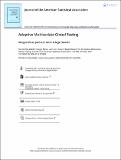Files in this item
Adaptive multivariate global testing
Item metadata
| dc.contributor.author | Minas, Giorgos | |
| dc.contributor.author | Aston, John A D | |
| dc.contributor.author | Stallard, Nigel | |
| dc.date.accessioned | 2018-08-03T09:30:10Z | |
| dc.date.available | 2018-08-03T09:30:10Z | |
| dc.date.issued | 2014-06 | |
| dc.identifier | 255153824 | |
| dc.identifier | fb70375a-37f6-44f9-9771-00f1eba89a78 | |
| dc.identifier | 25125767 | |
| dc.identifier | 84987876571 | |
| dc.identifier.citation | Minas , G , Aston , J A D & Stallard , N 2014 , ' Adaptive multivariate global testing ' , Journal of the American Statistical Association , vol. 109 , no. 506 , pp. 613-623 . https://doi.org/10.1080/01621459.2013.870905 | en |
| dc.identifier.issn | 0162-1459 | |
| dc.identifier.other | PubMedCentral: PMC4114150 | |
| dc.identifier.other | ORCID: /0000-0001-7953-706X/work/47136661 | |
| dc.identifier.uri | https://hdl.handle.net/10023/15760 | |
| dc.description.abstract | We present a methodology for dealing with recent challenges in testing global hypotheses using multivariate observations. The proposed tests target situations, often arising in emerging applications of neuroimaging, where the sample size n is relatively small compared with the observations' dimension K. We employ adaptive designs allowing for sequential modifications of the test statistics adapting to accumulated data. The adaptations are optimal in the sense of maximizing the predictive power of the test at each interim analysis while still controlling the Type I error. Optimality is obtained by a general result applicable to typical adaptive design settings. Further, we prove that the potentially high-dimensional design space of the tests can be reduced to a low-dimensional projection space enabling us to perform simpler power analysis studies, including comparisons to alternative tests. We illustrate the substantial improvement in efficiency that the proposed tests can make over standard tests, especially in the case of n smaller or slightly larger than K. The methods are also studied empirically using both simulated data and data from an EEG study, where the use of prior knowledge substantially increases the power of the test. Supplementary materials for this article are available online. | |
| dc.format.extent | 11 | |
| dc.format.extent | 684288 | |
| dc.language.iso | eng | |
| dc.relation.ispartof | Journal of the American Statistical Association | en |
| dc.rights | © Giorgos Minas, John Aston, Nigel Stallard. This is an Open Access article distributed under the terms of the Creative Commons Attribution License (http://creativecommons.org/licenses/by/3.0/), which permits unrestricted use, distribution, and reproduction in any medium, provided the original work is properly cited. The moral rights of the named author(s) have been asserted. | en |
| dc.subject | Adaptive design | en |
| dc.subject | Multivariate test | en |
| dc.subject | Neuroimaging | en |
| dc.subject | Power analysis | en |
| dc.subject | QA Mathematics | en |
| dc.subject.lcc | QA | en |
| dc.title | Adaptive multivariate global testing | en |
| dc.type | Journal article | en |
| dc.contributor.institution | University of St Andrews.Statistics | en |
| dc.identifier.doi | 10.1080/01621459.2013.870905 | |
| dc.description.status | Peer reviewed | en |
This item appears in the following Collection(s)
Items in the St Andrews Research Repository are protected by copyright, with all rights reserved, unless otherwise indicated.

